In today’s fast-paced and competitive market, businesses must adapt to emerging technologies to stay relevant and thrive. Artificial intelligence (AI) has become a game-changer, empowering companies to transform their strategies, optimize operations, and gain a competitive edge.
By leveraging AI, organizations can uncover new growth opportunities, enhance decision-making, and deliver personalized customer experiences that set them apart in the ever-evolving digital landscape. Developing a robust AI business strategy is no longer a choice but necessary for organizations aiming to lead and innovate in the modern era.
AI in Action: Redefining the Future of Business Strategy
AI business strategy integrates AI into the company’s operations, decision-making, and growth plans. Unlike traditional strategies based on manual processes and historical data, those centered on AI leverage machine learning, data analytics, and automation to drive innovation.
How AI is Transforming Business Strategy
Artificial Intelligence (AI) is revolutionizing businesses’ craft and executing their strategies, driving a profound shift in decision-making and operational efficiency. By leveraging machine learning, natural language processing, and advanced data analytics, AI empowers organizations to extract actionable insights from massive datasets.
These insights allow companies to anticipate market trends, understand customer preferences, and optimize resource allocation. AI-driven automation further enhances efficiency by streamlining repetitive tasks, reducing errors, and freeing human capital to focus on higher-value activities. This integration of AI into business operations not only improves current processes but also enables businesses to adapt to changing environments proactively.
Beyond efficiency, AI is reshaping the competitive landscape by fostering innovation and enabling companies to deliver more personalized and engaging customer experiences. Predictive analytics allow businesses to foresee customer needs, while recommendation engines and chatbots enhance interaction and satisfaction.
AI also aids in risk management by identifying potential vulnerabilities and suggesting proactive solutions. By integrating AI into their strategic frameworks, companies can create dynamic and adaptive strategies that respond quickly to evolving challenges and opportunities, positioning themselves for long-term success in an increasingly digital and data-driven marketplace.
The Growing Need for AI-Driven Decision Making
The growing need for AI-driven decision-making is underscored by the exponential increase in global data generation, which reached 120 zettabytes in 2023 and is projected to hit 181 zettabytes by 2025. Studies reveal that organizations leveraging AI and data analytics are significantly more likely to achieve faster decision-making than internal colleges.
Additionally, McKinsey reports in 2023 that AI adoption leads to substantial increases in operational efficiency and improvements in revenue through data-driven insights. In sectors like marketing, retail, and finance… predictive analytics powered by AI enhance forecasting accuracy, giving businesses a significant edge in agility and market responsiveness. These statistics highlight the indispensable role of AI in processing data to drive informed, timely, and strategic decisions.
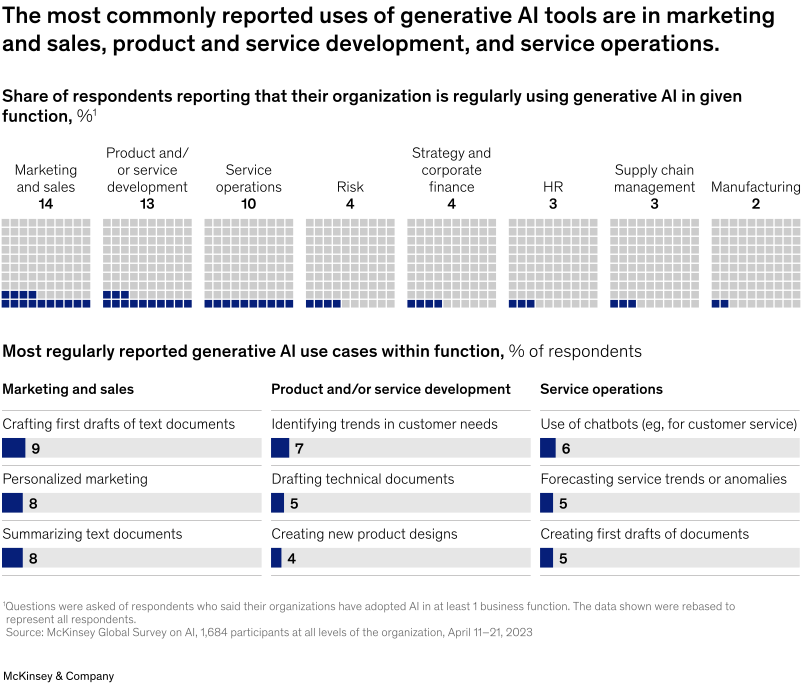
(Source: McKinsey Report)
Understanding AI and Its Strategic Value for Businesses
Artificial intelligence and business strategy encompass a range of essential components and technologies that work together to enable businesses to harness AI effectively. This integration enhances decision-making processes, boosts efficiency and precision, and promotes strategic flexibility across diverse areas of operation.
Core Components of AI Relevant to Business Strategy
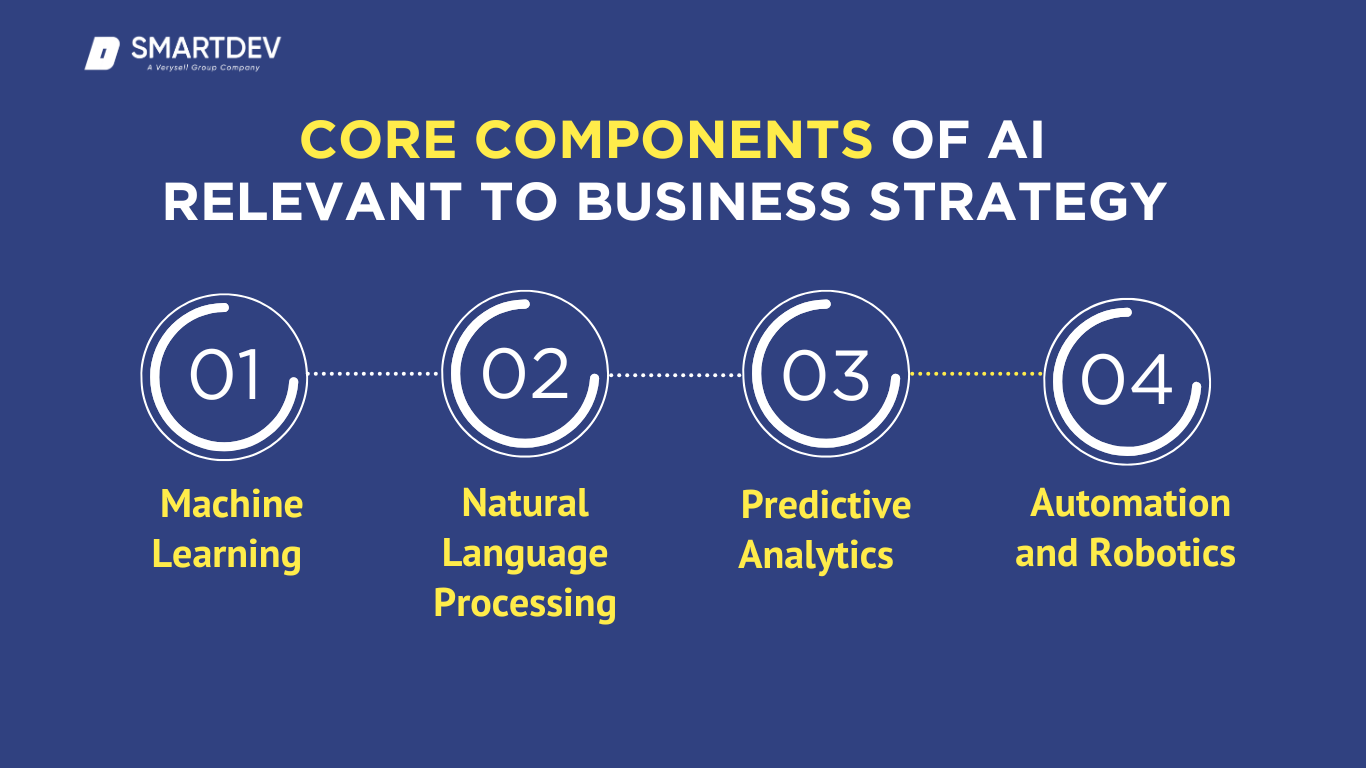
Machine Learning (ML)
Machine learning lies at the heart of AI-driven business strategies. It enables systems to learn from data and improve performance without explicit programming. Businesses leverage ML for customer segmentation, fraud detection, and personalized marketing campaigns, ensuring data-driven decision-making and optimized operations.
ML empowers machines to learn from data autonomously, predicting outcomes and optimizing strategies based on patterns identified in vast datasets. It enhances decision-making by providing predictive insights and improving processes.
Natural Language Processing (NLP)
NLP empowers businesses to understand and interact with human language, transforming unstructured text data into valuable insights. From chatbots and virtual assistants to sentiment analysis and content generation, NLP facilitates enhanced customer engagement and streamlines communication. It supports sentiment analysis, facilitates customer interactions through chatbots, and extracts valuable information from textual data, aiding informed decision-making.
Predictive Analytics
Predictive analytics utilizes AI algorithms to analyze historical and current data, forecasting future trends, behaviors, and outcomes with remarkable accuracy. This component is crucial for businesses aiming to anticipate customer needs, manage inventory efficiently, and identify potential risks before they materialize.
For example, predictive analytics helps retailers forecast seasonal product demand, financial institutions prevent loan defaults, and healthcare providers identify patients at risk of certain conditions. By making data-driven predictions, companies can stay ahead in dynamic markets.
Automation and Robotics
Automation and robotics streamline repetitive tasks and enhance operational efficiency across industries. For instance, Robotic Process Automation (RPA) automates routine administrative tasks such as invoice processing and data entry, reducing errors and freeing up human resources for strategic activities.
In manufacturing and logistics, AI-powered robotics enhance precision, speed, and productivity, consistently handling complex tasks. These technologies not only save time and costs but also allow businesses to scale operations while maintaining high standards of quality and reliability.
Artificial Intelligence and Traditional Business Strategy: A Comparative Transformation
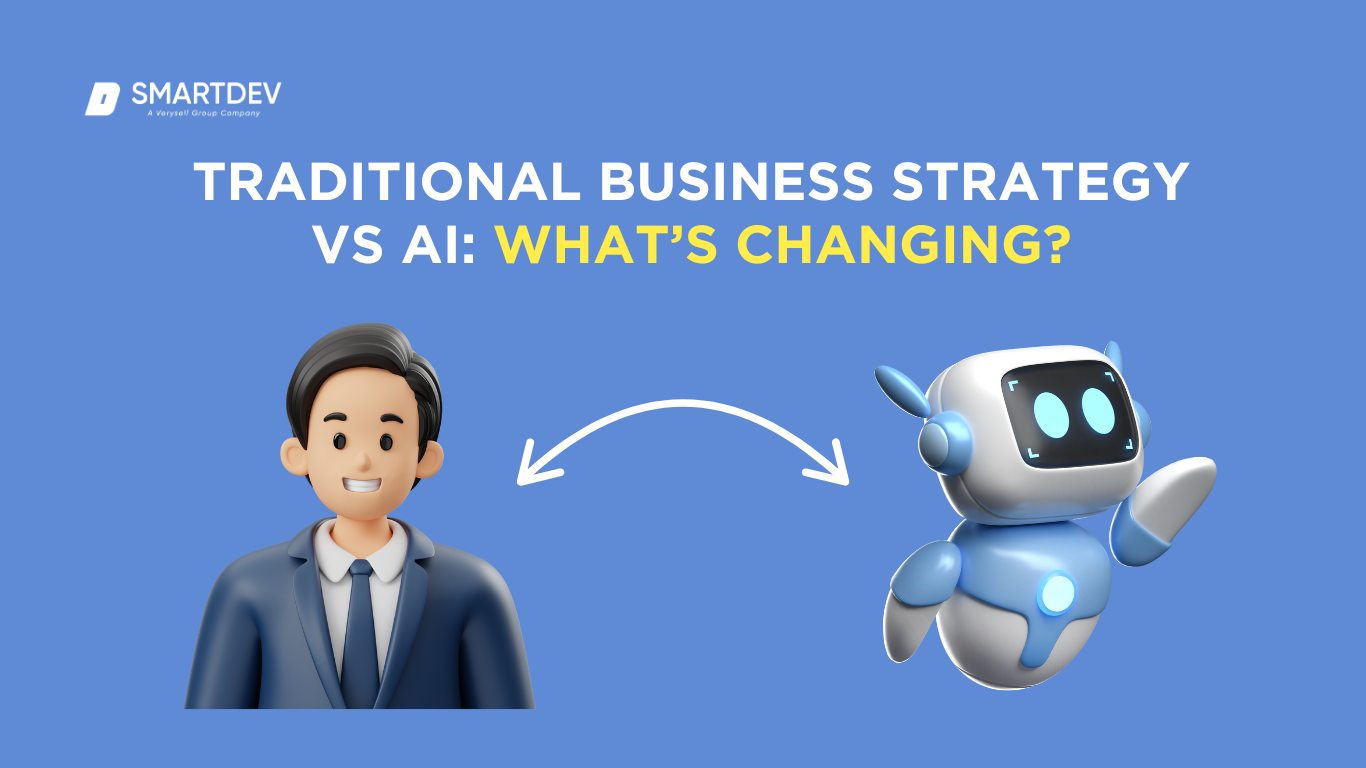
Artificial Intelligence (AI) is revolutionizing traditional business strategies by shifting the focus from intuition-based decisions to data-driven insights, fundamentally transforming how organizations operate and compete.
Traditional strategies often rely on historical trends and human judgment, which, while valuable, can be limited by subjective bias and slower adaptability. In contrast, AI enables businesses to analyze vast amounts of data in real-time, uncovering patterns and trends that were previously inaccessible.
For example, companies using AI-driven predictive analytics have reported significant improvements in forecasting accuracy, leading to better resource allocation and reduced operational costs.
According to Forbes, a typical case of how AI drives transformation can be observed during the COVID-19 pandemic. Consider the pandemic an external, disruptive event that severely impacted the global economy and distorted traditional predictions. Supply chain leaders utilizing predictive analytics in early 2019 and 2020 could not foresee or account for the economic shock caused by the pandemic using traditional data. This is precisely when AI stepped in, demonstrating its ability to adapt and provide solutions in unprecedented scenarios.
Amazon: A Leading Force in Transforming Supply Chain Management Through AI

Managing a global supply chain involves challenges like predicting product demand, optimizing inventory levels, and streamlining logistics. Amazon needed to efficiently manage its massive inventory while minimizing costs and promptly meeting customer demands.
Strategy:
- Sophisticated AI Algorithms for Inventory Management: Amazon utilizes advanced AI-driven algorithms to optimize its inventory management processes, ensuring efficiency and accuracy.
- Demand Forecasting: These algorithms analyze vast amounts of data to predict product demand with high precision. Key factors considered include purchasing trends, seasonal variations, and shifting market conditions.
- Real-Time Adaptability: The system enables Amazon to adjust inventory levels in real-time, responding swiftly to changes in demand and market dynamics.
- Improved Operational Efficiency: By accurately forecasting and adapting, Amazon minimizes overstocking and stockouts, reducing operational costs while improving customer satisfaction.
- Competitive Advantage: This predictive approach streamlines inventory management and enhances Amazon’s ability to stay ahead in a rapidly evolving e-commerce landscape.
Results:
- Reduced operational costs through efficient inventory management.
- Improved customer satisfaction with timely deliveries and availability
Key Benefits of Aligning AI with Business Strategy
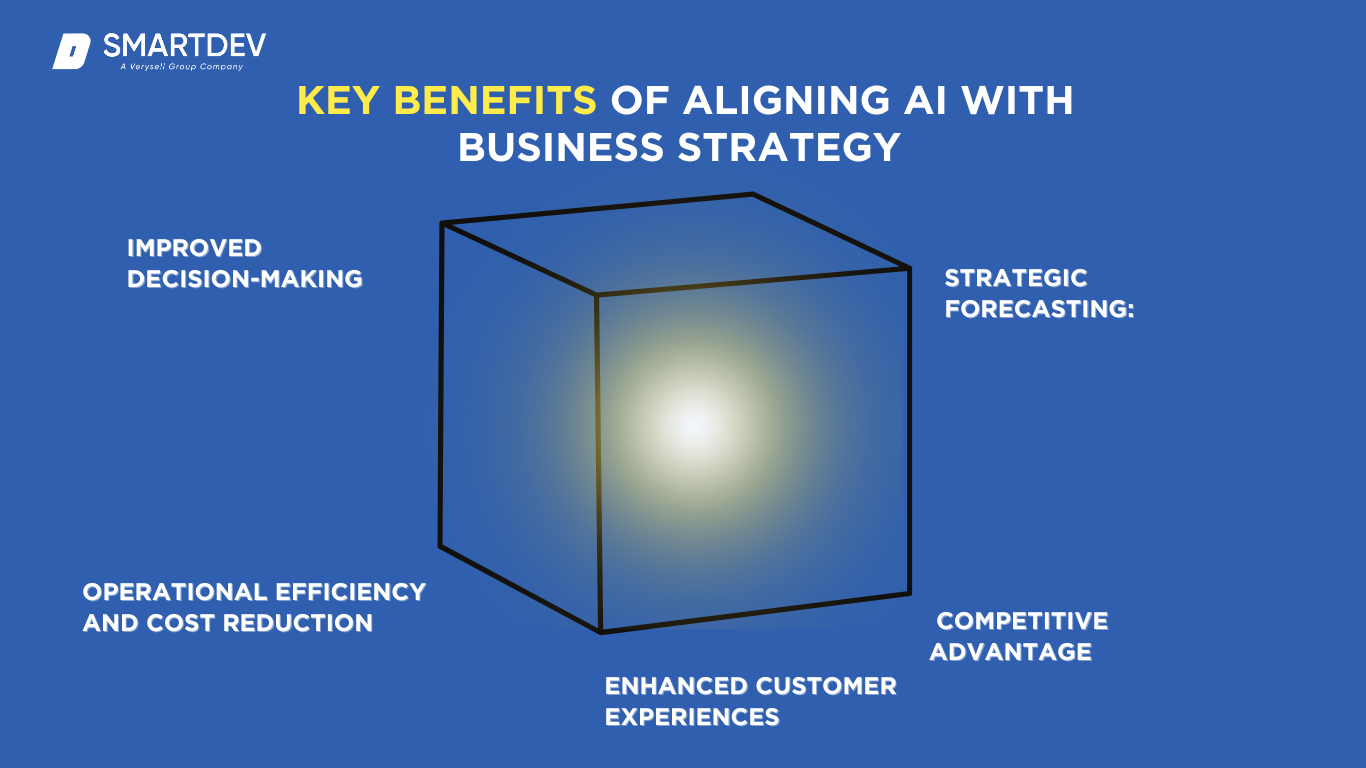
As the business landscape grows increasingly competitive, organizations must adopt innovative strategies to maintain their edge and secure long-term success. For organizations that embrace this shift, AI has the potential to redefine their trajectory and drive sustainable growth in an ever-changing global market. According to a survey conducted by consulting firm Gartner, 79 percent of corporate strategists believe AI and analytics will play a crucial role in their organization’s success within the next two years A separate survey by PwC found that 73 percent of U.S. companies have already integrated AI into some area of their business, creating a competitive edge over those that have yet to explore its potential.
- Improved Decision-Making: AI provides data-driven insights that enable accurate analysis and timely, well-informed decisions, reducing reliance on intuition alone.
- Operational Efficiency and Cost Reduction: AI enhances productivity by automating repetitive tasks and optimizing workflows, lowering operational costs and improving resource utilization.
- Enhanced Customer Experiences: AI-powered tools, such as chatbots and personalized recommendation systems, allow businesses to deliver tailored and engaging customer interactions, fostering loyalty and satisfaction.
- Competitive Advantage: Leveraging AI innovation helps companies stay ahead of market trends and competitors, positioning them as industry leaders.
- Strategic Forecasting: AI’s predictive capabilities enable businesses to forecast trends and proactively address future challenges, ensuring adaptability and resilience in dynamic markets.
Developing an AI-Driven Business Strategy: A Step-by-Step Guide
By aligning AI capabilities with business objectives, companies can address critical challenges, improve customer experiences, and stay ahead of the competition. The following steps provide a structured approach to integrating AI into your business strategy, ensuring both immediate impact and long-term success.
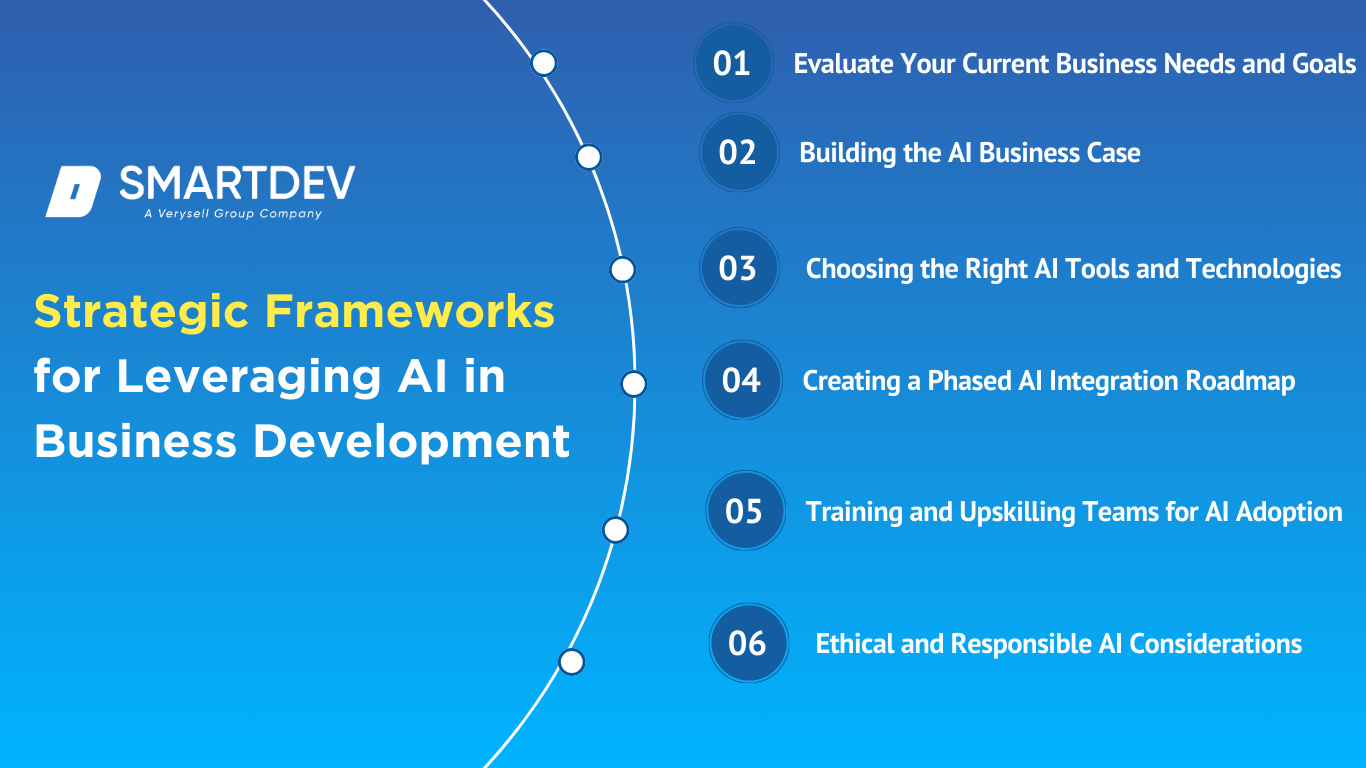
Step 1: Evaluate Your Current Business Needs and Goals
The journey toward an AI-driven business strategy begins with thoroughly understanding your organization’s current landscape and objectives.
- Conducting an AI Readiness Assessment: Assess your organization’s infrastructure, data management capabilities, and workforce skillsets to determine your readiness for AI integration. This involves evaluating current technological gaps and identifying areas where AI could provide significant value.
- Identifying Key Problem Areas AI Can Solve: Analyze operational inefficiencies, customer pain points, and strategic bottlenecks that could benefit from AI. For example, consider automating repetitive tasks, optimizing supply chain operations, or improving customer personalization through data analytics.
Step 2: Building the AI Business Case
Crafting a compelling business case for AI adoption is essential to gain support from stakeholders and decision-makers.
- Cost-Benefit Analysis of AI Implementation: Conduct a detailed financial analysis to outline the costs of AI deployment against its expected benefits. Highlight potential gains such as increased efficiency, enhanced productivity, and cost savings.
- ROI Expectations and KPIs to Measure Success: Define specific metrics to evaluate the success of AI initiatives. Examples include a percentage increase in operational efficiency, an error rate reduction, or customer retention growth. These measurable outcomes provide clarity and accountability.
Step 3: Choosing the Right AI Tools and Technologies
Selecting the right AI tools and technologies is critical to ensure alignment with your business goals and operational needs.
- Overview of AI Software and Platforms: Explore the landscape of AI solutions, ranging from machine learning platforms for predictive analytics to natural language processing tools for improved customer interactions. Understand the capabilities of each technology and how it applies to your business context.
- Aligning Technology with Business Objectives: Ensure that the chosen AI tools support specific business goals, whether it’s streamlining operations, enhancing customer engagement, or optimizing supply chain processes. Additionally, scalability and compatibility with the existing system should be considered.
Step 4: Creating a Phased AI Integration Roadmap
A phased approach to AI implementation ensures a smooth transition and minimizes disruptions to existing operations.
- Short-Term vs. Long-Term AI Initiatives: Develop a strategic roadmap for quick-win projects, such as automating repetitive tasks, while planning for more ambitious long-term AI transformations, like fully integrated predictive analytics.
- Ensuring Cross-Department Collaboration: Foster collaboration across departments to break down silos and promote shared insights. For example, involve marketing, operations, and IT teams in discussions to ensure alignment and maximize AI’s impact.
Step 5: Training and Upskilling Teams for AI Adoption
Preparing your workforce is key to successfully transitioning to an AI-driven strategy.
- Upskilling Staff for AI Literacy: Implement training programs to equip employees with the knowledge and skills required to operate and manage AI tools. This can include workshops on machine learning basics, data interpretation, and tool-specific functionalities.
- Leadership and Change Management: Equip leaders to manage organizational change effectively, ensuring they can guide teams through the AI transition. This involves fostering a culture of innovation and addressing any resistance to new technologies.
Step 6: Ethical and Responsible AI Considerations
Ethics and governance must be central to your AI strategy to build trust and ensure compliance.
- AI Governance Frameworks: Establish clear policies and frameworks that govern the use of AI, ensuring compliance with regulatory requirements and alignment with organizational values. These frameworks should address accountability, transparency, and data security.
- Addressing Bias and Ethical Concerns in AI: Develop proactive measures to identify and mitigate bias in AI algorithms. This ensures fairness and builds trust among stakeholders, including customers, employees, and partners. For instance, regularly auditing AI systems can help maintain ethical standards and avoid unintended consequences.
Unilever: Key Insights on How AI is Shaping Business Strategy

Unilever has emerged as a leader in utilizing AI to transform its human resources strategy, particularly in talent acquisition and workforce planning. By integrating advanced AI tools, the company has revolutionized how it identifies and evaluates potential candidates.
According to Forbes, Unilever processes an astounding 1.8 million job applications annually to fill over 30,000 positions. This enormous volume of applications requires significant time and resources to manage. As a multinational organization operating in 190 countries, Unilever’s applicants come from diverse global regions. Finding the right talent is critical to the company’s success, and relying solely on traditional recruitment methods risks overlooking qualified candidates lost among countless resumes.
To address this challenge, Unilever collaborated with Pymetrics, a company specializing in AI-based recruitment solutions, to develop an online platform. This platform enables candidates to undergo initial assessments remotely, from the convenience of their computers or smartphones.
This innovative approach has resulted in a 16% increase in talent diversity. Such achievements were made possible by employing unbiased datasets to train the AI systems and ensuring human oversight in their application, allowing for a more inclusive and effective recruitment process.
Possible Challenges in Implementing AI for Business Strategy
 Lack of AI Expertise and Talent Gaps
Lack of AI Expertise and Talent Gaps
One of the primary challenges businesses face when adopting AI is the need for more skilled professionals who can develop, implement, and maintain AI solutions. Many organizations need help finding data scientists, machine learning engineers, and AI specialists, leading to delays in deployment and underutilization of AI technologies. Additionally, existing employees often need more knowledge to work effectively with AI tools, creating a gap that hinders progress.
Data Silos and Inconsistent Data Quality
Successful AI implementation relies on the availability of high-quality, consistent, and accessible data. However, many organizations operate with data silos, where information is stored across disparate systems and departments, making it difficult to integrate. Furthermore, poor data quality, such as missing, outdated, or inaccurate information, reduces the effectiveness of AI models, leading to suboptimal results and flawed decision-making.
Resistance to Change within the Organization
Introducing AI into business strategies often encounters resistance from employees and stakeholders who fear job displacement or feel uncertain about the new technology. This resistance can slow down adoption, hinder collaboration, and create an environment of mistrust. Overcoming this challenge requires effective change management strategies, including clear communication about AI’s benefits and role in complementing, rather than replacing human efforts.
Managing AI Ethics and Governance
The ethical implications of AI usage pose significant challenges for businesses. Issues such as algorithmic bias, lack of transparency, and privacy concerns must be addressed to ensure responsible AI deployment. Organizations also face the complex task of developing governance frameworks that balance innovation with compliance, ensuring AI systems align with ethical standards, regulations, and societal expectations.
The Future of AI in Business Strategy
Artificial intelligence has become an integral part of the modern era, significantly shaping decision-making processes in business planning and strategy development through advanced forecasting models. Its application in business strategy has continually evolved, breaking barriers and enabling more effective coordination. Below are several anticipated developments shortly.
AI and Emerging Technologies: IoT, AR/VR, and Blockchain
The integration of artificial intelligence (AI) with emerging technologies such as the Internet of Things (IoT), augmented/virtual reality (AR/VR), and blockchain is transforming business landscapes. AI enhances IoT by enabling predictive maintenance and real-time analytics, creating smarter and more responsive systems.
In AR/VR, AI drives immersive customer experiences and training simulations by personalizing interactions and rendering environments. Meanwhile, blockchain and AI together improve data security, transparency, and decision-making through decentralized AI-driven systems. This convergence offers businesses unprecedented opportunities for innovation and operational efficiency.
AI-Driven Autonomous Businesses: Fact or Fiction?
The concept of fully AI-driven autonomous businesses, where AI handles operations, decision-making, and customer interactions with minimal human intervention, is becoming increasingly plausible. While current technologies like robotic process automation (RPA) and machine learning can automate routine tasks, achieving true autonomy requires advancements in general AI and ethical governance.
Despite challenges such as data privacy, ethical considerations, and technological limitations, the shift towards semi-autonomous models is already visible in sectors like logistics and retail. Autonomous businesses remain more fact than fiction, albeit requiring years of development for full-scale realization.
Future Trends in AI and Their Impact on Business Strategy
Future trends in AI, such as edge computing, explainable AI, and AI ethics, are reshaping business strategies. Edge AI reduces latency and enhances real-time decision-making by processing data closer to its source, benefiting industries like healthcare and manufacturing.
Explainable AI addresses the need for transparency in AI decisions, helping businesses build trust with stakeholders. Additionally, the growing emphasis on ethical AI forces companies to integrate responsible practices into their strategies. These trends push businesses to prioritize adaptability, innovation, and responsible AI integration to remain competitive.
Generative AI (e.g., ChatGPT, Bard)
Generative AI models, such as ChatGPT and Bard, are revolutionizing content creation, customer service, and product development. These tools can generate human-like text, images, and designs, enabling businesses to scale personalized interactions and streamline workflows.
For instance, in marketing, generative AI enhances copywriting and campaign strategies, while in product design, it accelerates prototyping and innovation. However, challenges like content accuracy and misuse highlight the need for robust oversight and quality control. Generative AI is poised to become a critical asset in fostering creativity and efficiency in business operations.
AI-Augmented Strategic Decision-Making
AI-augmented strategic decision-making leverages advanced analytics, natural language processing, and machine learning to provide data-driven insights and scenario simulations.
By analyzing vast datasets, AI helps leaders identify trends, predict market changes, and assess risks with greater precision. Tools like AI dashboards and recommendation systems enable informed decision-making, reducing human biases and increasing efficiency.
However, human oversight remains crucial to ensure contextually appropriate and ethically sound strategies. As businesses embrace AI augmentation, they gain a competitive edge in navigating complex and dynamic market environments.
Actionable Checklist: Build Your AI Business Strategy Today
 Assess Business Objectives
Assess Business Objectives
Start by clearly defining your business objectives and aligning them with measurable outcomes. This includes identifying key performance indicators (KPIs) and understanding how AI can address challenges or enhance processes. Evaluate areas like cost reduction, customer engagement, or operational efficiency to ensure AI adoption aligns with your overarching goals. This foundational step creates a focused direction for implementing AI solutions effectively.
Identify Strategic Areas for AI Implementation
Pinpoint the business processes and functions where AI can add the most value. Consider areas such as customer service automation, predictive analytics, supply chain optimization, or fraud detection. Prioritize opportunities based on their potential impact and feasibility, while also assessing industry trends and competitors’ AI adoption strategies. This step ensures that AI resources are directed toward the most critical and impactful aspects of your business.
Select AI Tools and Platforms
Choose the right AI tools and platforms tailored to your needs. Research various AI providers and assess their offerings in terms of scalability, compatibility, ease of use, and support. Consider factors like cloud-based versus on-premises solutions, customization options, and integration capabilities with existing systems. This step ensures that your AI infrastructure is robust, flexible, and aligned with your technological environment.
Conduct ROI Analysis
Perform a detailed return on investment (ROI) analysis to justify the AI investment. Analyze costs, including implementation, training, and maintenance, against the anticipated benefits such as revenue growth, cost savings, and improved efficiency. Establish realistic timelines for realizing returns, and develop risk mitigation strategies to address potential challenges. This ensures financial prudence and sets clear expectations for stakeholders.
Train Teams on AI Capabilities
Invest in training your workforce to use and manage AI technologies effectively. Provide workshops, online courses, and hands-on practice sessions to build their competency in AI tools and processes. Emphasize understanding AI’s capabilities and limitations to foster confidence and innovation. A well-trained team is essential for maximizing the benefits of AI and ensuring seamless integration into your workflows.
Monitor and Optimize AI Integration
Establish a system for ongoing monitoring and evaluation of AI performance. Use analytics to measure success against KPIs and identify areas for improvement. Regularly update algorithms, refine processes, and incorporate user feedback to enhance AI’s effectiveness. Staying proactive in optimization helps maintain a competitive edge and ensures that your AI initiatives continue to deliver value over time.

 Lack of AI Expertise and Talent Gaps
Lack of AI Expertise and Talent Gaps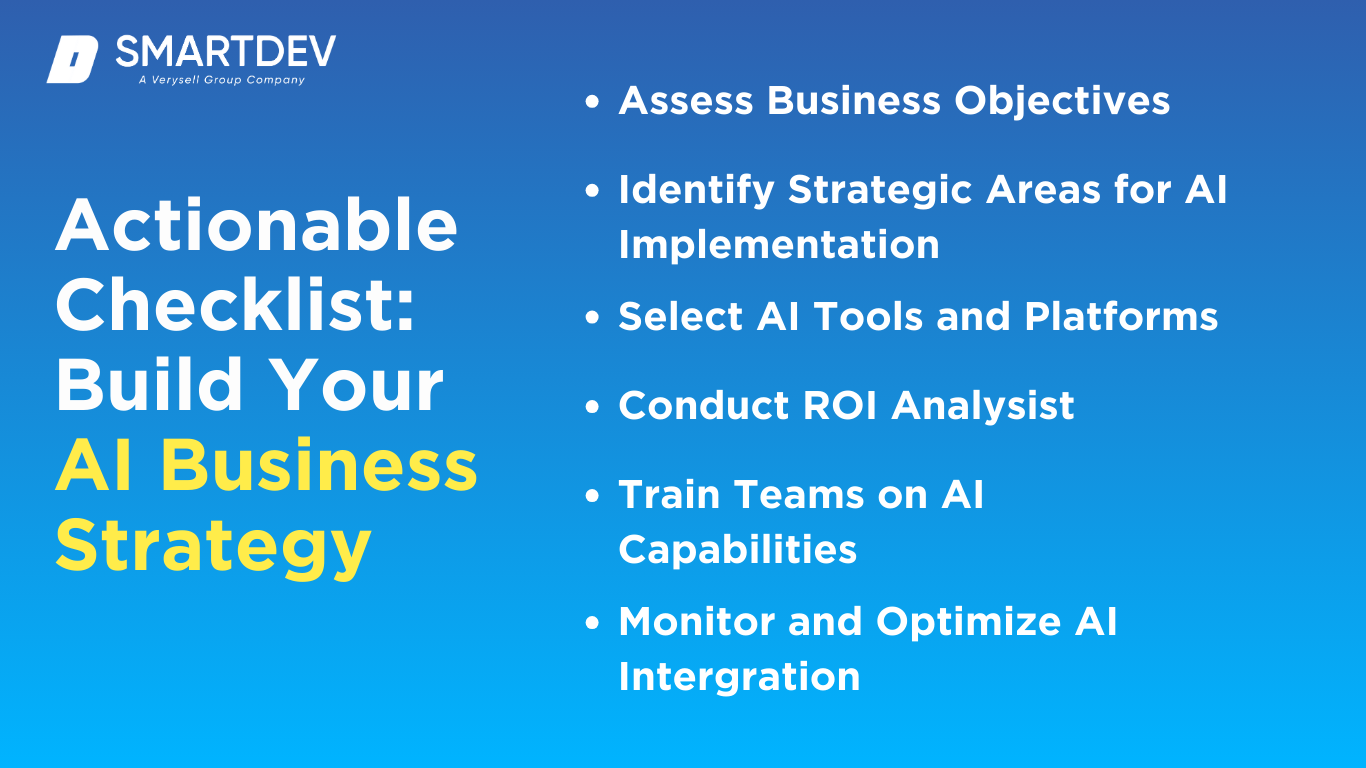 Assess Business Objectives
Assess Business Objectives




